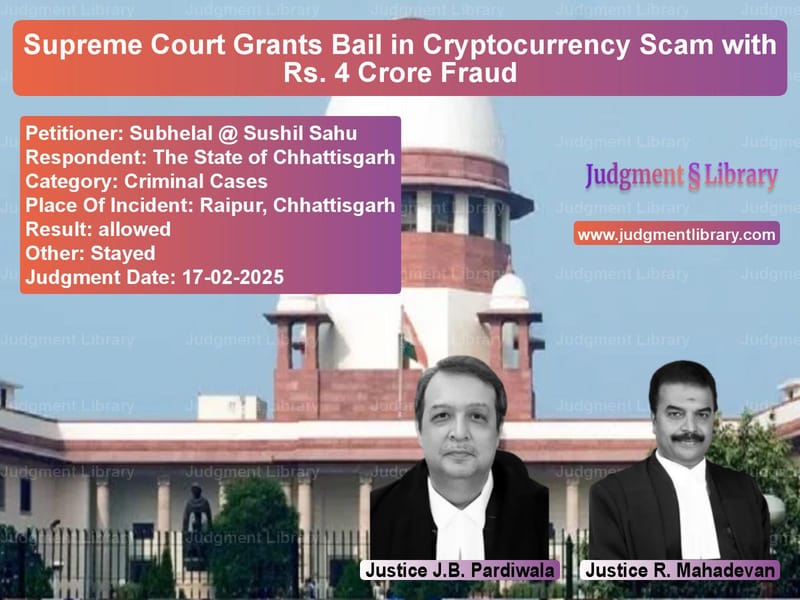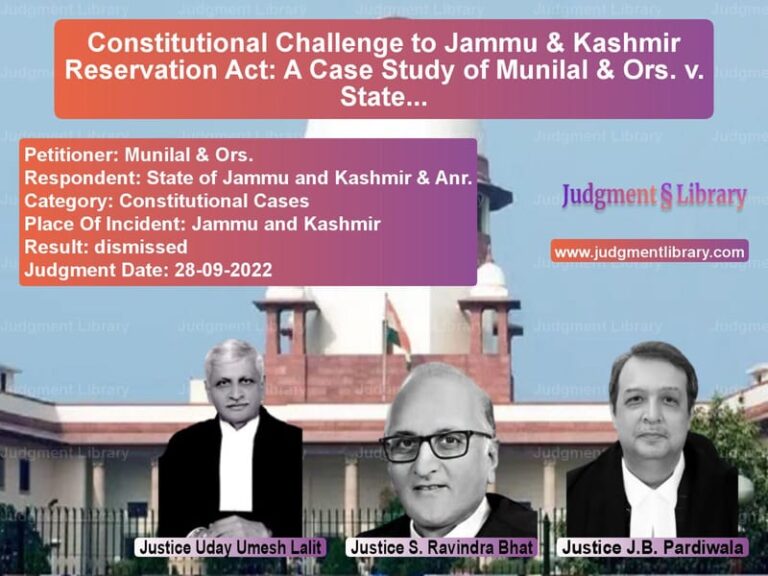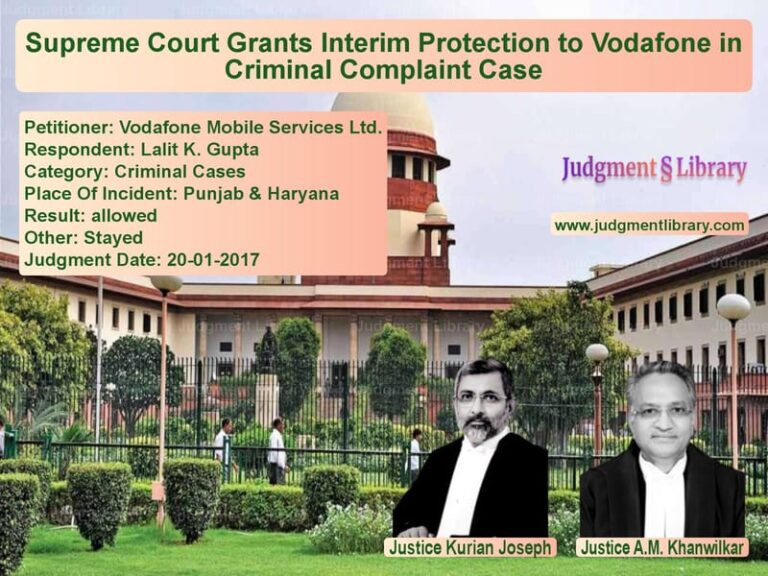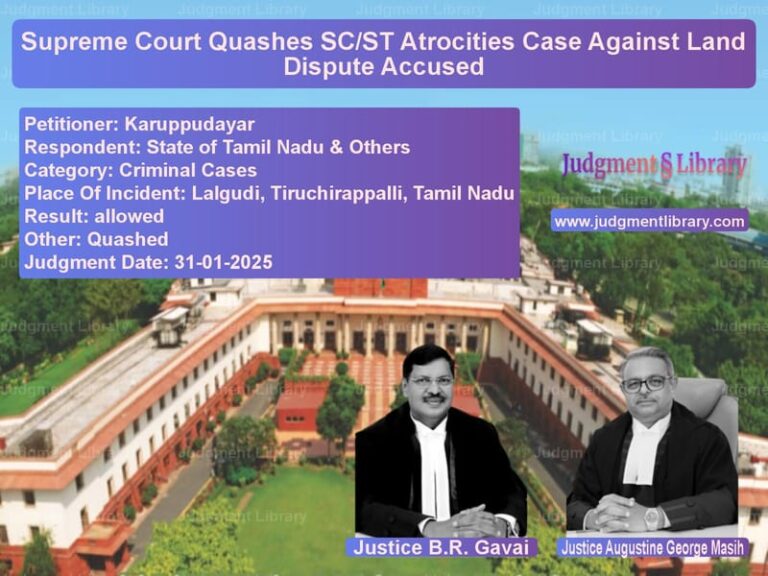Supreme Court Grants Bail in Cryptocurrency Scam with Rs. 4 Crore Fraud
The Supreme Court of India recently delivered a significant judgment in the case of Subhelal @ Sushil Sahu v. The State of Chhattisgarh, where the appellant sought bail after being accused in a cryptocurrency-related fraud case amounting to Rs. 4 crores. The case raised crucial questions about the right to bail in economic offenses and the applicability of Section 437(6) of the Code of Criminal Procedure (CrPC).
Background of the Case
The appellant, Subhelal @ Sushil Sahu, was accused of orchestrating a cryptocurrency scam that allegedly defrauded nearly 2000 investors. An FIR (Crime No. 460/2023) was registered against him at Police Station Dindayal Upadhyay Nagar, Raipur, Chhattisgarh, under Sections 420 (cheating), 201 (causing disappearance of evidence), 120-B (criminal conspiracy), and 34 (acts done by several persons in furtherance of common intention) of the Indian Penal Code (IPC).
The investigation revealed that Sahu, along with his co-accused, lured investors into a fraudulent cryptocurrency scheme, promising high returns. However, when the investors attempted to withdraw their funds, they found that the platform was non-functional, leading to criminal complaints. The police filed a charge sheet against five individuals, including the appellant.
Legal Proceedings
The appellant moved the High Court of Chhattisgarh, Bilaspur, seeking bail, but his request was denied on July 22, 2024. The High Court cited the seriousness of the crime and the financial losses suffered by investors as reasons for rejecting bail. Dissatisfied with the decision, the appellant approached the Supreme Court.
Key Legal Issues
The Supreme Court considered the following key questions:
- Whether the extended pre-trial detention of the appellant violated his right to a speedy trial under Article 21 of the Constitution.
- Whether the bail conditions under Section 437(6) CrPC should be applied in economic offenses.
- Whether the nature of the allegations justified prolonged incarceration before trial completion.
Petitioner’s Arguments
The appellant, represented by senior counsel, made the following submissions:
- He had been in custody since December 2023, and with 189 prosecution witnesses listed, the trial was unlikely to conclude soon.
- Under Section 437(6) CrPC, an accused in a non-bailable offense triable by a Magistrate should be granted bail if the trial is not completed within 60 days from the first date of taking evidence.
- The Chief Judicial Magistrate, Raipur, who was conducting the trial, could impose a maximum sentence of seven years, making prolonged detention disproportionate.
- The prosecution had not demonstrated any concrete risk of the appellant absconding or tampering with evidence.
Respondent’s Arguments
The State of Chhattisgarh, represented by the prosecution, countered the arguments as follows:
- The crime was serious, affecting nearly 2000 investors, and involved Rs. 4 crore in fraud.
- The case required extensive witness examination, making trial delays unavoidable.
- Releasing the appellant on bail could allow him to tamper with evidence or abscond.
- The bail conditions under Section 437(6) were not absolute, and the Magistrate had discretion to deny bail for justified reasons.
Supreme Court’s Observations
The Supreme Court, led by Justices J.B. Pardiwala and R. Mahadevan, acknowledged the serious nature of the offense but emphasized the need to balance justice with the right to a speedy trial. The Court made the following key observations:
“The trial is being conducted by the Chief Judicial Magistrate, who can impose a maximum punishment of seven years. Given that the prosecution intends to examine 189 witnesses, trial completion will take an unreasonable amount of time.”
“The right to a speedy trial is fundamental, and prolonged incarceration without trial violates Article 21 of the Constitution.”
“Section 437(6) of the CrPC is aimed at preventing excessive pre-trial detention, and bail should be granted unless there are compelling reasons to deny it.”
The Court also referred to the Gujarat High Court’s ruling in Nehul Prakashbhai Shah v. State of Gujarat, which explained that bail should be granted under Section 437(6) unless specific risks justify continued detention.
Final Judgment
The Supreme Court ruled in favor of the appellant and granted bail under the following conditions:
- The appellant was required to deposit Rs. 35,00,000/- with the trial court within six months.
- He was prohibited from leaving the country and had to surrender his passport.
- He was required to appear regularly before the trial court and cooperate with the proceedings.
- If the Rs. 35 lakh deposit was not made within six months, the bail would be automatically canceled.
Impact of the Judgment
This ruling has several important implications:
- It reinforces the principle that extended pre-trial detention should not be used as punishment.
- It clarifies that Section 437(6) CrPC applies to economic offenses and can be used to secure bail in lengthy trials.
- It sets a precedent for balancing justice in white-collar crimes where financial loss is high but trials take years to conclude.
- It underscores the judiciary’s role in preventing unnecessary deprivation of liberty.
By granting bail with financial conditions, the Supreme Court has provided a balanced approach, ensuring both justice for the victims and fairness for the accused.
Petitioner Name: Subhelal @ Sushil Sahu.Respondent Name: The State of Chhattisgarh.Judgment By: Justice J.B. Pardiwala, Justice R. Mahadevan.Place Of Incident: Raipur, Chhattisgarh.Judgment Date: 17-02-2025.
Don’t miss out on the full details! Download the complete judgment in PDF format below and gain valuable insights instantly!
Download Judgment: subhelal-@-sushil-sa-vs-the-state-of-chhatti-supreme-court-of-india-judgment-dated-17-02-2025.pdf
Directly Download Judgment: Directly download this Judgment
See all petitions in Money Laundering Cases
See all petitions in Bail and Anticipatory Bail
See all petitions in Fraud and Forgery
See all petitions in Judgment by J.B. Pardiwala
See all petitions in Judgment by R. Mahadevan
See all petitions in allowed
See all petitions in Stayed
See all petitions in supreme court of India judgments February 2025
See all petitions in 2025 judgments
See all posts in Criminal Cases Category
See all allowed petitions in Criminal Cases Category
See all Dismissed petitions in Criminal Cases Category
See all partially allowed petitions in Criminal Cases Category







